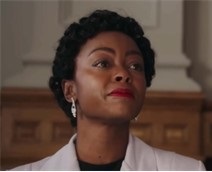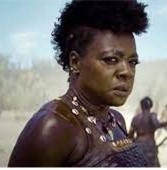|
|
|
|
|
|
To Andrea, Viola and Danielle



Orrin Konheim called it. At the Cinema Lounge film discussion, he cited the social media campaign behind Andrea Riseborough’s quest for an Oscar nomination. Many Hollywood A-listers, including Jane Fonda, Gwyneth Paltrow, Edward Norton, Naomi Watts, Kate Winslet, Laura Dern, Cate Blanchett, Sarah Paulson, Demi Moore, Courtney Cox, Frances Fisher, Jennifer Aniston, and Minnie Driver spread the word in social media about Riseborough’s performance in To Leslie. Some even hosted private screenings. But the none of the Oscar precursors recognized Riseborough. I hadn’t even heard of the film until January. It barely cracked $27,000 at the box office. Still, Orrin was right. There was Riseborough with one of the five Oscar Best Actress nominations. Of course, Riseborough’s nomination had a flip side. Viola Davis, thought to be a strong contender for The Woman King, was snubbed. Even more shocking was that Danielle Deadwyler, considered by many, including me, to be a lock for her work in Till, was also left out. A surprise nomination for a white actress, along with omissions for two African-American actresses, provided bad optics only a few years after the #OscarsSoWhite controversy. I had mixed feelings about Riseborough’s nomination. To the best of my knowledge, To Leslie never played near where I live. It’s one matter for people not to have seen an Oscar nominee. It’s quite another for people not to even have had the opportunity to see a nominee. This plays into some of the most biting Oscar criticisms, that they are decided by elitist voters. It exacerbates the disconnect between the Oscars and the filmgoers reflected in the ceremony’s declining ratings. I wish the big names behind the To Leslie campaign had devoted some of their resources to support a robust national theatrical release. Despite my misgivings, it became clear to me that the backlash against Riseborough’s nomination went too far. The Academy launched an investigation into the campaign with the implied threat of rescinding the nomination. Studios for years have coordinated massive Oscar PR campaigns costing many millions. A VOX feature from 2019 noted that “Academy members receive For Your Consideration (FYC) booklets, DVDs, copies of screenplays, and CDs of soundtracks; they field invitations to screenings and Q&As; and they are targeted by FYC ads in industry publications, on social media, and, if they live in a place like New York or Los Angeles, ads on billboards, in the subway, and atop cabs. The process usually starts in the fall, after the blitz of film festivals in Venice, Telluride, and Toronto, and intensifies over the next six months leading up to the Oscars.” To point fingers at Riseborough and her supporters for their smaller and cheaper but effective campaign reeks of hypocrisy. Lost in all the controversy was whether Riseborough’s performance, which at least in theory is what the nominations recognize, proved worthy. I finally saw To Leslie on Amazon Prime and can report that she holds the screen from beginning to end. She plays the title character, an alcoholic single mother who blew her lottery winnings and lost custody of her son. Riseborough simply inhabits Leslie so quickly and so thoroughly that you don’t see acting. You feel like you could go to a Texas dive bar right now and see Leslie there. Her performance is both brave and naturalistic. Riseborough never panders to the audience or tries to make Leslie likable. As such, Leslie’s vulnerability, and her efforts to change, become that much more affecting. Riseborough deserves the nomination. The touchy part is that Davis and Deadwyler also deserved recognition. Davis transformed herself physically and emotionally to play Nanisca, the leader of an all-female African warrior tribe. Deadwyler brought the gravitas needed for Mamie Till-Mobley, whose bravery in the face of tragedy helped launch the modern civil rights movement. She conveyed Mamie’s heartbreak in a touching but understated way. Deadwyler illustrated Mamie’s courage and clarity perfectly. I saw a tape of the real Mamie Till Mobley at the Smithsonian’s National African-American Museum, and saw that Deadwyler truly captured her essence. Ideally Riseborough, Davis and Deadwyler would all be recognized, along with the current front-runners Cate Blanchett for Tár and Michelle Yeoh for Everything Everywhere All at Once. Michelle Williams was magnificent as a fictionalized version of Steven Spielberg’s mother in The Fabelmans, but she’s in the wrong category. The story centers on the Spielberg stand-in Sammy Fabelman, not his parents. There are whole sections of the movie where Williams doesn’t appear much. The real crime though, is Ana de Armas as Marilyn Monroe in Blonde. De Armas is a talented actress, as she showed in Knives Out and No Time to Die. She was convincing, but the story did not allow her to flesh out Monroe as a three-dimensional character. Blonde portrayed Monroe as nothing more than a tragic victim. The film simply moves from one victimization to the next, without exploring at all what made Monroe such a captivating screen presence. Not only is that view of Monroe seriously outdated, but it did not serve the character or the actress playing her well. Blonde garnered seven Razzie nominations all of which it earned. It might not be the worst film ever to have an Oscar nomination, but it’s close. After Deadwyler missed out on a nomination, Till director Chinonye Chukwu posted that “We live in a world and work in industries that are so aggressively committed to upholding whiteness and perpetuating an unabashed misogyny towards Black women.” Her statement might seem harsh at first, but less so in the light of two African-American women excelling while playing strong leaders passed over for an actress depicting a white icon as a perpetual victim. Deadwyler added that “Cinematic history is 100+ years old. I would dare say the system is deeply, deeply impacted by systemic racism that has shaped our country.” That might also seem harsh but consider that of the past 94 Best Actress winners, exactly one of them was African-American. That one, Halle Berry, has more recently shared that she thought she was breaking down the door for other black actresses and was sorely disappointed that there’s been no one since. In response to the #OscarsSoWhite controversy, the Academy dramatically increased its membership with an eye for diversity. Those moves produced some positive results. Two women in a row winning Best Director probably would not have happened 20 years ago. Same with Parasite, a foreign language film, winning Best Picture. But there’s still a long way to go before we see anything resembling a level playing field. In a Hollywood Reporter interview, The Woman King director Gina Prince-Bythewood lamented how her film garnered high marks from critics and did $94 million at the box office, but did not receive a single Oscar nomination. She opined that “It’s not a snub. It’s a reflection of where the Academy stands and the consistent chasm between Black excellence and recognition.” Once again, this statement may appear harsh, but consider that not one black filmmaker has won a Best Director Oscar. Not one black female filmmaker has even been nominated. Super Bowl winning coach Bill Parcells once said that “You are what your record says you are.” The Academy’s record with black actresses and filmmakers cannot be described as anything but atrocious. To some degree this may reflect society at large, but not completely. We’ve had a black President by now. Still, we can acknowledge the Academy’s severe shortcomings without diminishing Andrea Riseborough’s nomination. Her well-deserved recognition did not cause these long-standing problems. Ideally, the Oscars could celebrate all forms of cinematic excellence, including stellar African-American actresses and a white actress shining in a no budget indie. That the Academy can’t do both is a loss for the movies and those who cherish them. Adam Spector March 1, 2023 Contact us: |
|
